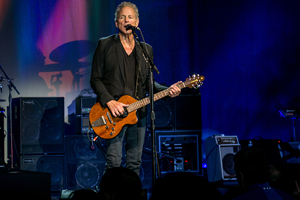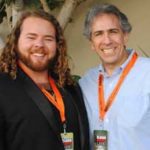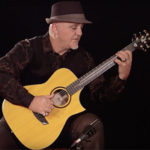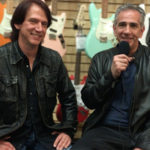A look back at some famous six-string schisms…
By Gary Graff
April 20, 2018
Without a doubt, one of the biggest music stories of the past two weeks was Lindsey Buckingham’s latest split from Fleetwood Mac — and we’re still not sure whether he quit or was fired. It’s not the first time Buckingham has left the Mac in dramatic fashion, and it’s certainly not the first time a pivotal guitarist’s departure from a successful band shocked the world. We thought it was a good time to review a dozen previous splits, many of which still have tongues wagging in retrospect…
Eric Clapton and the Yardbirds, 1965
Clapton was a blues purist when he joined the Yardbirds in 1963, happy with the group’s first two singles — “I Wish You Would” and “Good Morning, School Girl” — but less pleased by the mainstream pop approach of “For Your Love,” which wound up being a Top 10 hit in the U.S. Clapton left the group on March 25, 1965, the day “For Your Love” was released, and went on to join John Mayall’s Bluesbreakers.
Jeff Beck and the Yardbirds, 1966
Beck came to the Yardbirds as Clapton’s replacement, recommended by Jimmy Page. He brought a distinctive, contemporary edge to singles such as “Heart Full Of Soul,” “Shapes Of Things” and “Over Under Sideways Down” as well as the Yardbirds album (aka Roger The Engineer). But Beck, citing poor health, left during the Dick Clark Caravan of Stars tour in 1966 and the group subsequently fired him that November, moving Page from bass to lead guitar. During the Yardbirds’ 1982 Rock and Roll Hall of Fame induction, Beck famously noted that “They fired me, so f*** ’em…”
Brian Jones and the Rolling Stones, 1969
Jones’ disintegrating position in the Stones — partly fueled by drug use and erratic behavior, partly creative (and ego) differences — was brewing out of the public eye for some time before a parting of the ways during June of 1969. Jones was also unable to obtain a U.S. visa to tour with the group because of his drug convictions in the U.K. Jones, who was replaced by Mick Taylor, maintained that his departure might be temporary, but he died under mysterious circumstances, drowned in his swimming pool, on July 3, 1969, less than a month later.
Jeremy Spencer and Fleetwood Mac, 1971
A co-founder of Fleetwood Mac at the invitation of Peter Green, Spencer was also the first band member to release a solo album, a self-titled set during 1970. Spencer was growing vociferously dissatisfied with the band, and during an early 1971 U.S. tour disappeared during a stop in Los Angeles, resurfacing a few days later having taken up with the religious sect Children of God. Spencer made music with the Children and has most recently worked as a solo artist.
Robin Trower and Procol Harum, 1971
Trower’s powerful playing was certainly evident on Procol Harum’s first five albums, but he and the band increasingly grew apart, which led to his departure after the Broken Barricades album. Trower was replaced by Dave Ball and he went on to his own great success as a solo artist, mostly fronting a trio that allowed him plenty of room for his electric and adventurous explorations.
Ritchie Blackmore and Deep Purple, 1975 and 1993
Blackmore was a dominant and demanding force in the ranks of Deep Purple, which he co-founded during 1968. Weathering three major lineup changes, he became particularly disenchanted with the funk and R&B elements creeping during June 1975 after touring to support the Stormbringer album. He came back as part of a reunion of Purple’s famed Mk. II lineup in 1984, producing the Perfect Strangers album followed by a high-grossing concert tour. He stuck around until November of 1993, quitting again mid-tour. Joe Satriani was a short-term replacement before current guitarist Steve Morse joined in 1994. Blackmore declined to attend Purple’s Rock and Roll Hall of Fame induction in 2016.
Steve Hackett and Genesis, 1977
Genesis was not a decided upswing during the mid-70s, having weathered the departure of Peter Gabriel and regularly playing arena shows. But Hackett, who had joined the group in 1971, felt both constricted in his playing and frustrated by a constant battle to get more of his material on record — reaching a head with 1976’s Wind & Wutheringalbum. He toured to support the project but left during the fall of 1977, while the live album Seconds Out was being mixed. He was not formally replaced and Mike Rutherford took over all guitar and bass duties.
Joe Perry and Aerosmith, 1979
Perry leaning against frontman Steven Tyler may have been Aerosmith’s defining and indelible image, but the bond broke during July of 1979. With drug use escalating other tensions within the group, a backstage fight after an appearance at the World Series of Rock festival in Cleveland — during which Perry’s then-wife Elissa also mixed it up with bassist Tom Hamilton’s wife — led to, depending who’s telling it, Perry’s decision to leave Aerosmith or, in Tyler’s account, his firing. Perry was replaced first by Richie Supa and then Jimmy Crespo, and he returned to Aerosmith for good in 1984.
Lindsey Buckingham and Fleetwood Mac, 1987
This year was not the first time Buckingham parted ways with Fleetwood Mac. The first, and until now most dramatic, came during August of 1987, when the group was preparing to tour in support of its Tango In The Night album — which had started life as a Buckingham solo album. Buckingham wanted to return to his own music and left the band after an acrimonious meeting at Christine McVie’s house. He was replaced for the tour by Billy Burnette and Rick Vito.
Dickey Betts and the Allman Brothers Band, 2000
Co-founder Betts was a mainstay throughout the Allmans’ on-and-off career, serving for a time as the group’s sole guitar player during the ‘70s, following Duane Allman’s death. He played his final show with the group on May 7, 2000, at the Midtown Festival in Atlanta. He took the group to court after the other founding members demanded — reportedly via fax — that he clean up his substance abuse issues, settling in arbitration. He recently came out of retirement to schedule some shows this year.
Brian “Head” Welch and Korn, 2005
Welch was happily part of Korn’s headbanging, debauched early career until he became a born again Christian and announced he would be “dedicating his musical pursuits to that end,” acrimoniously leaving the band. Welch recorded a pair of solo albums and started the group Love and Death, as well as writing three books, but reconciled with Korn in 2012 and has been back in the band ever since.
Tom DeLonge and blink-182, 2015
blink-182 had already crashed and burned once, in 2005, before reforming four years later. Animosities remained, however. and all three members have portrayed the reunion as dysfunctional. DeLonge stepped away in order to pursue “non-musical activities” and maintains he did not intend to leave the band. Bassist Mark Hoppus and drummer Travis Barker were not inclined to wait, however, bringing in Matt Skiba from Alkaline Trio as, so far, a permanent replacement.






